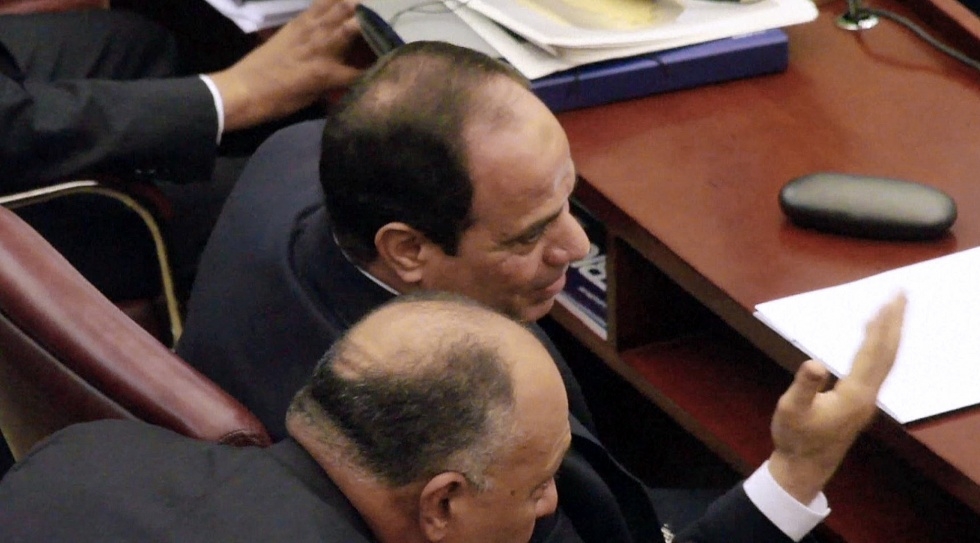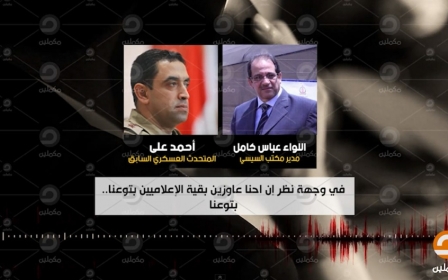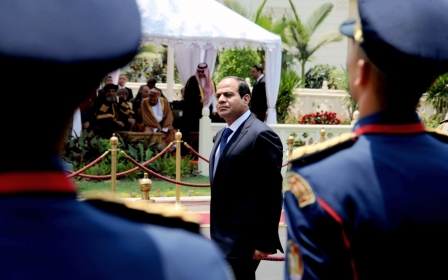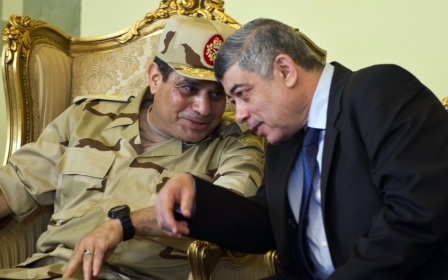Sisi should be prosecuted over electoral 'fraud' - politician

An alleged leak from the office of Egyptian President Abdel Fattah al-Sisi casts doubt on the legality of his presidency, opposition politicians said on Wednesday.
A leaked recording appears to feature Sisi’s office manager implying that the then-presidential candidate was not living at an address his registered in his official campaign papers, a seeming violation of electoral law.
The recording, aired by Turkey-based satellite channel Mekameleen earlier this week, known for supporting Sisi’s ousted predecessor, is alleged to be from April 2013 when Sisi was about to launch his election campaign.
Ahead of the campaign Sisi, then chief of Egypt’s armed forces, registered his address as Building Number Six, a special residence designated for military officials.
The building is part of a complex in the capital Cairo that includes a military hospital and a training college.
At the time, reports in the Egyptian media suggested that Sisi was not living at that address. Workers in the complex told reporters with local news site el-Watan that the military man rarely visited the site.
In the recording leaked on Monday, Sisi’s office manager appears to imply that media reports were correct, and that Sisi was not living in the military compound when he listed it at his address.
A voice, said to be that of office manager Abbas Kamel, is heard to say “the address we are publishing today is Building Six”.
The voice is then heard to tell a man said to be the military’s spokesperson, Ahmed Ali, to tell Egyptian media that the building is “used by former ministers . . . or something like that”.
"As a former member of the armed forces, and as he is the only candidate whose security is under threat," Sisi deserved to live in the building, the man said to be Kamel explained.
History of document scandals
Though a seemingly small detail, the suggestion that Sisi was not actually resident at the property registered as his address during the campaign has been seized by Egyptian commentators who say it casts doubt on his legitimacy.
Ayman Nour, who himself stood in presidential elections of 2005 and 2012, said Sisi could face prison time for forging documents.
“General Abbas Kamel admitted during his phone call with Ahmed Ali that the location of Sisi’s home as announced was not the real place . . . meaning that Sisi forged his official papers.”
Nour was released from prison in 2009 after four years in jail on charges that he forged papers relating to the establishment of his political party, Revolution Tomorrow. On Wednesday, he told news site Arabi21 that it is now up to the Egyptian judiciary to bring Sisi to account.
Egypt has a long history of scandals regarding the documents of electoral candidates.
In 2012, Hazem Abu Ismail, a Salafi politician with a broad base of support, was prevented from standing for election when it was discovered that his mother has US citizenship.
Egypt’s electoral law states that all candidates, as well as their spouses and parents, must have sole Egyptian citizenship.
Ismail is currently serving a seven-year prison term over charges that he tried to deceive the electoral commission.
In the 2012 elections, eventually won by the Muslim Brotherhood’s Mohammed Morsi, the party initially fielded its deputy chairman, Khairat al-Shater.
However, he was later forced to withdraw by the Supreme Council of the Armed Forces because he had been released from prison less than six years earlier.
After the 2013 election campaign, Sisi would eventually win the poll hands-down with over 93 percent of the vote.
However, turnout was low, with official figures estimated at around 47.5 percent. Some Egyptian broadcasters took to the airwaves to urge people to vote, with one infamous anchor warning Egyptians that Gulf states would withdraw their generous funding if citizens did not go to the ballot box.
New MEE newsletter: Jerusalem Dispatch
Sign up to get the latest insights and analysis on Israel-Palestine, alongside Turkey Unpacked and other MEE newsletters
Middle East Eye delivers independent and unrivalled coverage and analysis of the Middle East, North Africa and beyond. To learn more about republishing this content and the associated fees, please fill out this form. More about MEE can be found here.




